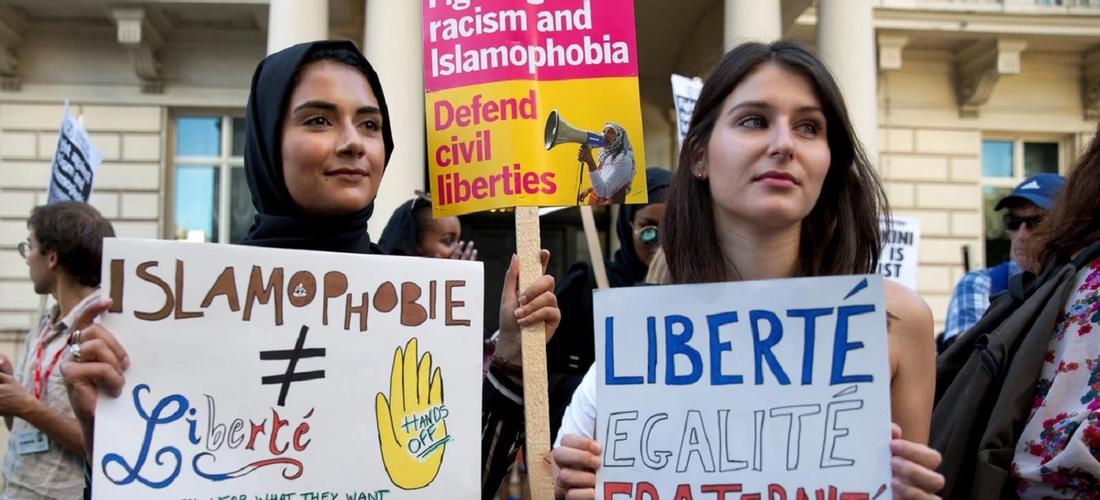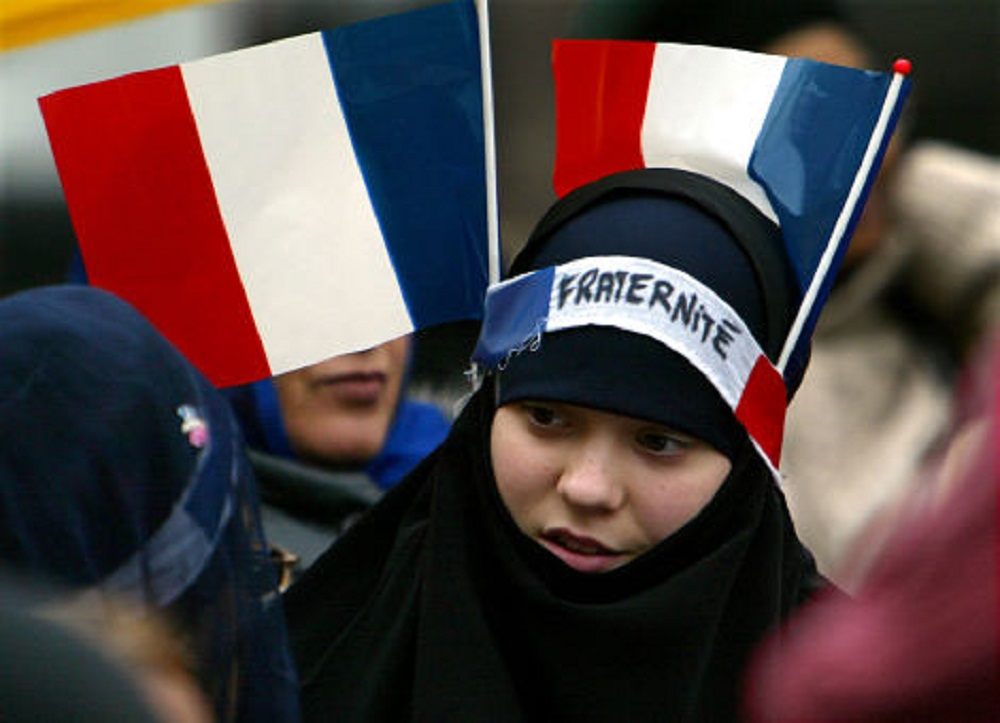'Hands Off My Hijab' - How a Hijab Ban Amendment Is Part of France's Larger Anti-Muslim History
Current Events
|
Apr 19, 2021
|
7 MIN READ

Image source: Twitter and MiddleEastEye
If you’re a Muslim woman, you probably have heard about the outrage around a hijab ban amendment in France. Early in April, an amendment to a proposed law that would reinforce “the respect of the [French] Republic’s principles” was passed by the French senate. This amendment bans the hijab for minors under the age of 18. Also banned are Muslim hijab-wearing mothers from accompanying their children on public school field trips.
This amendment isn’t law yet, because to become French law it must also be approved by France’s National Assembly, which many experts think will not happen.
But, as the founder of Blue Tin Production Hoda Katebi (an apparel manufacturing cooperative focusing on sustainability and new labor models in fashion supply chains), recently wrote for Vogue, “ ... such measures in the name of laïcité, or French secularism, are common tactics by conservative powers to test public reaction ... to determine how and when to actually push them through. … The very introduction of this proposal is cause for alarm.”
There is a deep French history of suspicion and a near animosity towards religion going back to the country’s history with the Roman Catholic Church, says Rim-Sarah Alouane, a Ph.D. candidate in comparative law and a researcher/legal academic at the University of Toulouse. In understanding this push-pull history between religion and a secular state, one can gain a greater understanding of why hijab ban amendments and laws as well as a rise in Islamophobia has been a constant issue in France, especially in the past two decades.
“In the United States, you have the wall of separation between church and state. This separation ... was built in a way to protect the believers against potential abusers from the state. In France it’s the other way around. We’re going to protect the state against the potential abusers of religion,” says Rim-Sarah.
I spoke with Rim-Sarah to better understand the history behind France’s ongoing efforts to keep religion out of state affairs and the public eye, which has spread into open religious bigotry against Muslims, as well as learn about what we can do to help French Muslims in their ongoing efforts to fight the targeting of the hijab and other forms of religious intolerance.

Rim-Sarah Alouane
Many in the media report that this amendment, which makes it illegal for girls under 18 to wear hijab, will likely fail in the National Assembly. Why minors?
The amendment is written broadly enough to apply to any religion. But of course it’s the veil that it’s targeting. Every time you have a law or an amendment of a law that is adopted, you have to check the intention of the lawmaker. And in the end, it’s [about] banning the hijab. Why minors? It has been going on since 2004 with a law on banning religious signs in public schools. Before 2004 minors in public school were allowed to wear religious signs, whether it was hijab, kippah or turban.
In 1989 we had the first wave of headscarf laws: A couple of Muslim female students in a school, in Paris suburbs were expelled for violating laïcité. It caused a national debate on Islam. The government asked the Council State, our highest administrative Supreme Court, for an opinion on the wearing of religious signs by minors in public states. The Council State was actually very liberal, saying that as long as public order is not disturbed by the wearing of a religious sign, the student can wear a religious sign.
So that was ok, but they didn’t stop there. Anti-Muslim bigotry was already at play. For years we had debates on it.
In 2004, finally a law was adopted that prohibited all religious signs in public schools. Religious neutrality was extended to minors – it wasn’t for just the state. And ever since it’s been going on and on. The government tried to ban the hijab at University [level], and they failed. Now they go back to minors.
The idea is that a student should be free of any religious pressure. [School] should remain a neutral environment. School is considered the place where you’re going to make a [French] citizen, and the hijab is perceived as a threat.
Why is religion seen as a threat in France?
France has a colonizer past. We colonized a lot of Muslim-majority countries. The starting point was Algeria. Algeria was [part of] France proper when they were colonized. That’s the difference with its neighbors [countries]. The Muslims in Algeria were considered indigenous. They were not considered French Muslims because they were Muslims. Applying laïcité would mean equaling them with others. And the hijab has a double kind of connotation in France. It’s an object of desire, this orientalism – what is behind the veil, the objectification of Muslim women. But it’s also perceived as a threat, because the hijab was used as empowerment against a colonizer.
The colonial period has really impacted this view of Muslims. Then you had the decolonization, which deeply affected France and Algeria until today.
Past colonialism in the 1960s/70s, you had immigration of North Africans to France because they needed labor. They worked in construction, and they lived in the suburbs, separated from the rest of the population. They were not supposed to stay. [But the North Africans] had babies born and raised in France, [who were] not French enough for the French and not North African enough for their homelands. The problem for the French establishment is that they didn’t see that coming.

Image source: Flickr Creative Commons
That's how it all began. All of a sudden, you had this visibility of Islam. Fast forward, you have second and third generations educated in France. Despite what a lot of people say, they are integrated. But the elite refuse to count them as such.
People want to be treated as equals. And that shakes up the establishment. They accuse of Muslims of not being able to integrate. French Muslim are French, but are never enough French. If you are wearing a hijab, you cannot be French. This is the thinking.
Tell us about this amendment.
Some members of the National Assembly tried to pass the amendment, but it failed. But then it went before the senate, which is majority Right wing. The Right wing has a dream to pass this, and they did. This amendment is part of a bill to strengthen [French] Republican values. My take is that the government is strongly fighting for that law to pass. They want it to sound like they aren’t targeting religious Islam, but rather political Islam. But, they don’t have a definition of political Islam. They think passing bills and amendments like this will preserve French values and help prevent radicalization.
But, explain to me with a straight face how stopping Muslim women in a headscarf from helping underpaid teachers looking after children on a field trip is radicalization?
The French legislature is also considering banning the wearing of hijab as an athlete in national sporting events, especially televised ones. Do you think that will happen?
It’s all about visibility. Nobody cares about the hijab when it's your maid who is wearing it. Because when Layla is going to clean a senator’s office, she is invisible. But when Layla’s kid, Sumayra, is highly educated, went to college, wears hijab, wants to have a more visible position and is fighting for her rights and is doing things that are very empowering, her visibility becomes a problem.
It’s a problem of feminism as well. You do have a lot of feminists who are anti-hijab. And it’s a matter of power and domination: “We know better. We are going to decide what is good for you. We’re going to end political Islam by telling a mother she cannot wear hijab on a school trip, or a hijabi footballer that she cannot wear hijab though she is a skilled player, or a young woman that she can’t wear a burkini on the beach.” It’s a colonial mentality.
France never ask Muslim women what they think. Because imagine if we did – we are empowering them.
And it’s not just the Right. It’s also the Left. Most of the laws targeting the headscarf, a good chunk of them came from the Left. The Right wing is more conservative. The Left is more anti-religion, believing religion to be a threat to freedom of thoughts.
What is the end game in all this? What can we, who don’t live in France, do to help French Muslims?
French Muslims are drained. They are tired of being used for political agenda. We are having an election next year. To be able to win an election, you have to satisfy the far Right. It’s actually scary: The more Muslim activists try to fight back, the more they are being accused of wanting to implement political Islam. And also those who give a voice to Muslims, like the Anglo-American press, the French authority hates that. The French hate to have their image tarnished.
I do believe in the values of this country, of liberté, égalité, fraternité. But now the leaders of this country are violating these values. Anti Muslim bigotry, in the end, is a business model. It makes money. You’re going to be paid tons of money to play the “Muslims are coming” card. There is also a difference between real life and what happens in political circles in Paris. There is racism and discrimination, but in the end people are trying to survive a pandemic, a social crisis, an economic crisis. And right now the government’s priority is to ban the hijab?
The authorities are trying to cover their incompetence from managing COVID, from managing our public services, from lagging tourism. We have students literally starving, we have mental and financial struggles, and your priority is to prohibit mothers wearing hijab from going on a school trip? Really?
The best thing anyone can do right now is keep elevating the story. Keep talking about this, Engage in storytelling. That’s what the authorities despise. Report on the situation accurately. People talk about France being bad, but that’s not the truth. We love our country. We want to see it succeed beyond what is happening now. French Muslims are yelling to anyone who wants to hear – we are French!
Subscribe to be the first to know about new product releases, styling ideas and more.
What products are you interested in?

